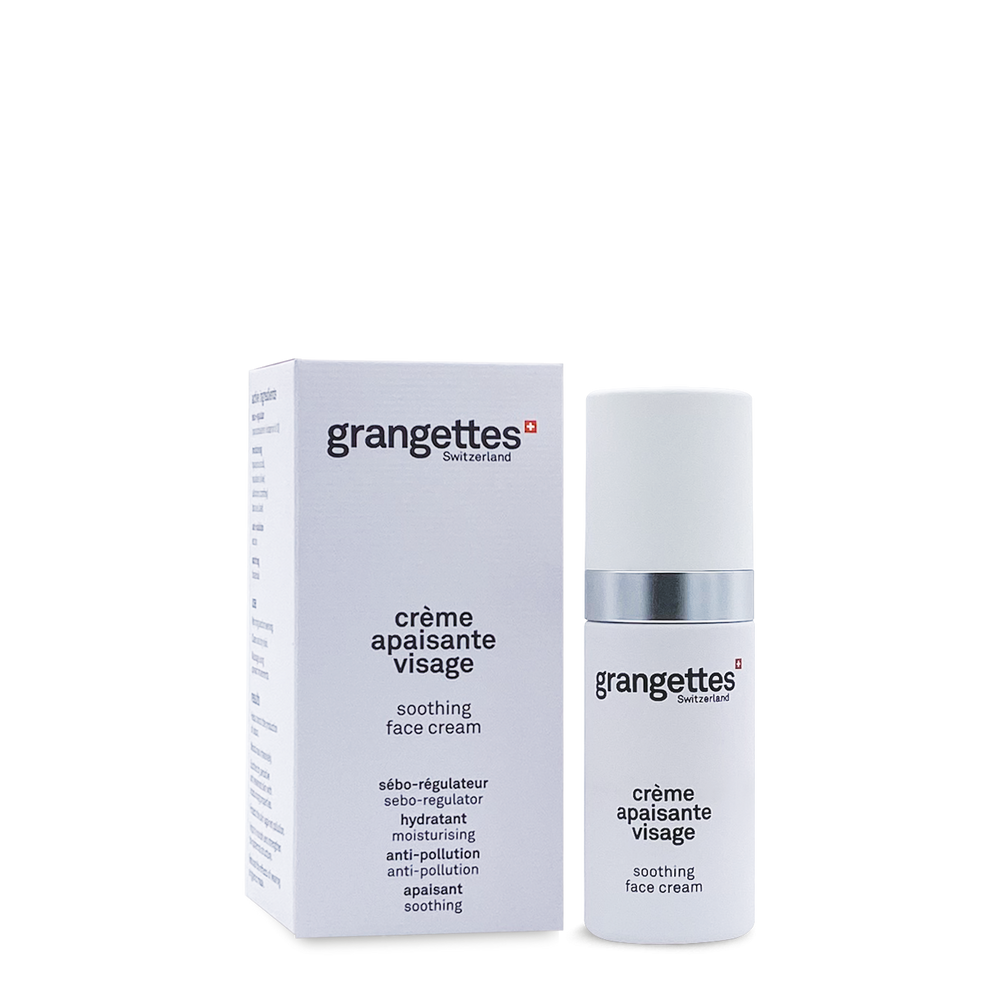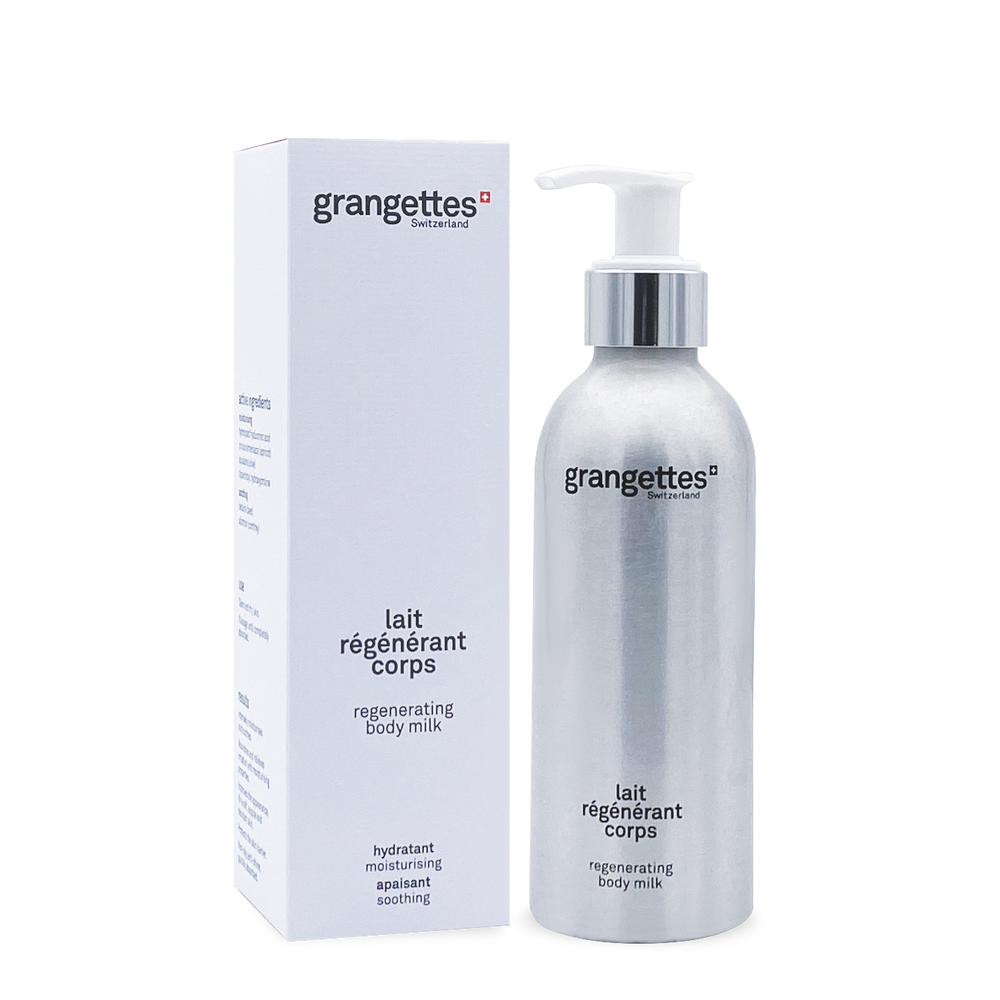Definition of squalane
Squalane is a derivative of squalene. It is a lipid of hydrocarbon composition produced naturally: it is found for example in human sebum, shark liver or even olive oil.
It is a cosmetic ingredient used for skin, cosmetic care and makeup.
In this article we describe the benefits it provides to the epidermis.
Vegetable, animal or synthetic squalane
The squalane can have three origins: synthetic, animal or vegetable. You will notice that the title of this article mentions the vegetable squalane uniquely. For what ? Because at Grangettes Switzerland, we take care to produce ethical cosmetics that respect the environment and therefore living beings. Therefore, we only use squalane of plant origin.
Animal origin
Did you know that the original squalane animated comes from the liver oil of sharks, which are fished solely for this purpose. The organ is removed and the shark is returned to the water. Obviously, we are deeply against this practice and we oppose it. As such, we support the fight for PETA and joined their label “Peta Animal Test Free and Vegan”. Beauty can and must be thought of with plant-based solutions, especially when they are equivalent or even superior!
plant origin
The vegetable squalane comes largely from olive oil ; but also the sugar cane, beets, rice or wheat. Its extraction is ecological and does not use any chemical components. Although it is an oily active ingredient, its feel is non-greasy and allows treatments to penetrate quickly, while making the skin silky.
The process of extracting plant squalane comes from green chemistry and does not involve any solvent in the case of vegetable squalane used in organic cosmetics.
In which cosmetic products can we find vegetable squalane?
We find the vegetable squalane in the shampoos, conditioners and hair masks. It deeply hydrates the hair and gives it volume, without leaving any greasy effects. But the squalane is also used in day creams, THE facial scrubs, THE body lotions, THE serums, shower oils, lotions…
- Regular price
- CHF 35.00
- Regular price
- Sale price
- CHF 35.00
- Unit price
- per
- Regular price
- CHF 35.00
- Regular price
- Sale price
- CHF 35.00
- Unit price
- per
The difference between squalene and squalane
Squalene is one of the main sebum constituents, the oily substance that keeps the outermost layer of the skin hydrated. the epidermis. Sebum contains approximately 13% squalene. This substance plays a central role for the skin: it protects us from UV rays and free radicals, and preserves the maintenance of the integrity of the hydro-lipid film.
The squalene is therefore naturally generated by our body, but its production slows down after 30 years. Skin conditions, spots, redness are then more frequent, and the skin becomes drier.
The squalane, for its part, is a derivative of squalene and is used in cosmetic formulations. Indeed, squalene is an unstable substance, which tends to oxidize easily. When the squalene which produces sebum oxidizes due to smoke, alcohol or exposure to the sun, we notice blemishes on the face.
The difference between the squalane and squalene is therefore found in the stability of the formula: the squalane is the stable substitute for squalene.
The benefits of vegetable squalane on the skin
An active ingredient close to the sebum of the skin
The composition of squalane is similar to that of the hydrolipidic film of the epidermis. This is what gives it its very strong affinity with the skin. We then say that he is biomimetic.
Protection against external aggressions
Its ability to restore the hydrolipidic film of the epidermis promotes the creation of a film on the surface of the skin. This protective barrier helps the skin protect itself from dirt, pollution and any other form of external aggression while preventing the dehydration process.
Against skin problems
Squalane works on uneven skin pigmentation, scars and dark spots. This ingredient also contains antibacterial properties and may be effective in treating symptoms of eczema. In addition, if you have acne, this ingredient, which reduces excessive sebum production, will be a real ally!
A powerful anti-aging ingredient
The vegetable squalane works effectively against free radicals in the skin which are caused by UV rays from the sun. It is therefore an ingredient that takes care of your skin cells, and fights against damage to the skin's natural collagen. Squalane is a liquid that spreads easily on the skin and penetrates deeply: it reduces the appearance of fine lines and wrinkles.
Emollient properties
An emollient product softens and softens the skin while promoting the absorption of treatments. This is one of the many benefits of vegetable squalane.
And on the hair?
By forming a protective film around the hair fiber, it protects the hair from dehydration and dryness. It is ideal for hair weakened by the sun, the use of heating appliances, coloring and the sun. It is for all these reasons that it is found in many hair treatments: masks, serums, conditioners, leave-in creams, etc.
Squalane as a dietary supplement
The vegetable squalane can also be ingested as a dietary supplement. Therefore, the capsules protect your body from arthritis, hemorrhoids, rheumatism, and certain skin problems such as psoriasis and shingles.
Grangettes Switzerland and vegetable squalane
The vegetable squalane is an ideal cosmetic active ingredient for dry and dehydrated skin. It repairs and protects the skin while maintaining its skin barrier and hydration. It also provides a dry touch, which improves the comfort and sensoriality of the products. When checking the composition of a cosmetic product, it is often indicated “squalane”, which does not allow us to know whether it is of synthetic, animal or plant origin. It is then necessary to do additional research to ensure that it is plant-based.
At the house of Grangettes Switzerland, the squalane used is always vegetable. Our commitment to the association PETA allows us to attest to this.






